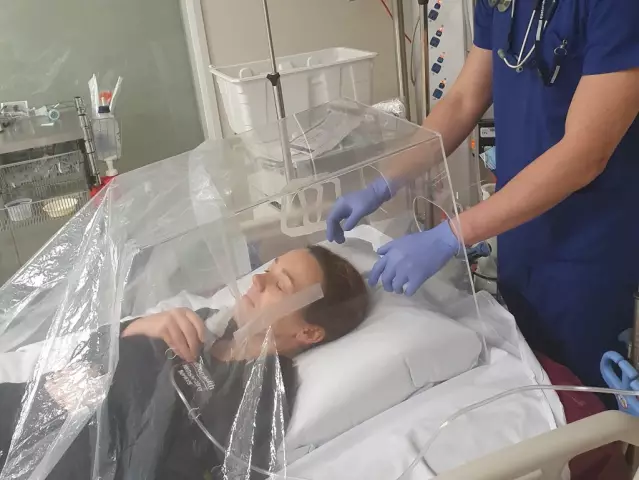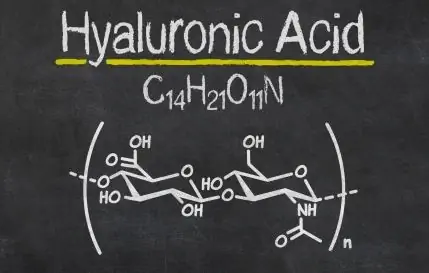- Author Rachel Wainwright wainwright@abchealthonline.com.
- Public 2023-12-15 07:39.
- Last modified 2025-11-02 20:14.
Beclomethasone aeronautical
Beclomethasone-aeronativ: instructions for use and reviews
- 1. Release form and composition
- 2. Pharmacological properties
- 3. Indications for use
- 4. Contraindications
- 5. Method of application and dosage
- 6. Side effects
- 7. Overdose
- 8. Special instructions
- 9. Application during pregnancy and lactation
- 10. Use in childhood
- 11. In case of impaired renal function
- 12. For violations of liver function
- 13. Drug interactions
- 14. Analogs
- 15. Terms and conditions of storage
- 16. Terms of dispensing from pharmacies
- 17. Reviews
- 18. Price in pharmacies
Latin name: Beclometasone-aeronativ
ATX code: R03BA01
Active ingredient: beclometasone (Beclometasone)
Producer: Nativa LLC (Russia)
Description and photo update: 2019-08-07
Prices in pharmacies: from 120 rubles.
Buy

Beclomethasone-aeronautical is a glucocorticosteroid (GCS) with anti-asthmatic action for inhalation use.
Release form and composition
The drug is released in the form of an aerosol for inhalation metered: a transparent colorless liquid contained under pressure in a bottle is sprayed as an aerosol jet when leaving (200 doses in an aluminum bottle with a dosing spray nozzle, in a cardboard box 1 bottle and instructions for use Beclomethasone- aeronaut).
Composition for 1 dose:
- active substance: beclomethasone dipropionate - 50/100/250 mcg;
- additional components: triethyl citrate, absolute ethyl alcohol grade A, propellant R 134a (1,1,1,2-tetrafluoroethane).
Pharmacological properties
Pharmacodynamics
Beclomethasone dipropionate is a prodrug and has a weak tropism for GCS receptors. Due to the action of esterases, it is biotransformed into the active metabolite beclomethasone-17-monopropionate (B-17-MP), which has a pronounced local anti-inflammatory effect. As a result of a decrease in the formation of chemotaxis substance, the active component reduces inflammation (effect on late-type allergy reactions), slows down the development of an immediate-type allergic reaction, which is caused by inhibition of the production of arachidonic acid metabolites and weakening of the release of inflammatory mediators by mast cells, and increases the rate of mucociliary transport.
Beclomethasone provides a decrease in the number of mast cells in the bronchial mucosa, a decrease in epithelial edema, inhibition of bronchial hyperreactivity, and mucus production by the bronchial glands. The active substance reduces the formation of inflammatory exudate, the secretion of lymphokines, the marginal accumulation of neutrophils, and also helps to inhibit the migration of macrophages, weaken the intensity of the processes of infiltration and granulation. Against the background of the use of Beclomethasone-aeronautical, the number of active β-adrenergic receptors increases, the patient's response to bronchodilators is restored, which makes it possible to reduce the frequency of their use. After inhalation, the agent almost does not show a resorptive effect. Beclomethasone-aeronautical is not intended for relief of bronchospasm, its therapeutic effect develops gradually, as a rule,5-7 days after the start of the course.
Pharmacokinetics
With inhalation use, over 25% of the administered dose of beclomethasone enters the respiratory tract, and the remainder settles in the oral cavity, pharynx and is swallowed. Before absorption in the lungs, the substance forms an active metabolite B-17-MP as a result of intensive metabolic transformation. Systemic absorption of this metabolite occurs in the lungs (36% of the pulmonary fraction) and the digestive tract (26% of the dose that got there after swallowing). The absolute bioavailability of beclomethasone dipropionate in unchanged form and B-17-MP averages 2 and 62% of the inhaled dose, respectively. Beclomethasone has a high absorption rate. The maximum concentration (C max) of the substance in the plasma is observed 0.3 hours after administration. Metabolite B-17-MP is absorbed more slowly, the period of reaching it is Cmax is approximately 1 hour.
An approximate linear relationship has been established between the increase in the dose administered by inhalation and the systemic exposure of the active substance. The distribution in the tissues of beclomethasone dipropionate is 20 l, B-17-MP - 424 l, plasma clearance - 150 and 120 l / h, respectively. Up to 87% of the drug binds to plasma proteins. The half-life (T 1/2) of the active substance and its metabolite is 0.5 and 2.7 hours, respectively.
Indications for use
- bronchial asthma: basic therapy for various forms of the disease in children over 4 years of age and adults;
- chronic obstructive pulmonary disease (COPD): maintenance therapy in patients with forced expiratory volume (FEV 1) less than 50% of the proper values (after inhalation of a bronchodilator) and with a history of repeated exacerbations in which severe symptoms of the disease persist despite regular treatment with bronchodilators.
Contraindications
Absolute:
- children up to age four;
- hypersensitivity to any component of the drug.
Relative (using Beclomethasone-aeronautical is required with caution): systemic infections (viral, bacterial, fungal, parasitic), glaucoma, pulmonary tuberculosis (active / inactive form), osteoporosis, hypothyroidism, liver cirrhosis, pregnancy and lactation.
Beclomethasone-aeronautical, instructions for use: method and dosage
Aerosol Beclomethasone-aeronative is indicated exclusively for the inhalation route of administration.
Inhalation rules:
- Before the first use of the inhaler, or in the case when it has not been used for 7 or more days, to check the operation of the balloon, it is required to remove the protective cap from the mouthpiece, vigorously shake the inhaler and press it, releasing one stream of the drug into the air.
- To carry out the inhalation of the Beclomethasone aerosol aerosol, remove the protective cap from the inhaler mouthpiece and shake the balloon vigorously. Then, holding the last one upside down, after a slow full exhalation, tightly clasp the mouthpiece with your lips. Taking the deepest possible breath at the same time, quickly press the bottom of the cylinder to release 1 inhalation dose. After that, holding your breath for a few seconds, you should remove the mouthpiece from your mouth and exhale slowly; close the inhaler mouthpiece with a protective cap.
- If necessary, the second dose is administered in the same way, but without shaking the inhaler at the beginning of the procedure.
- To avoid the development of candidiasis, after inhalation, rinse the mouth and throat with boiled water, while the water should not be swallowed.
- Once a week, you need to clean the inhaler mouthpiece. For this purpose, you need to remove the metal can from the case and rinse the case and cap with warm (but not hot) water, and then dry thoroughly without using heating devices. You cannot dip a metal spray into water. After drying, the cartridge is placed back in the case and the cap is put on.
Bronchial asthma
The daily dose of the drug is administered in several doses. Adults and adolescents from 12 years of age and older for basic therapy Beclomethasone-aeronautical should be used regularly, even in the absence of symptoms of the disease. The dose of the drug is set individually, taking into account the severity of bronchial asthma and the clinical effect.
The recommended initial daily doses of Beclomethasone-aeronautic depending on the severity of the disease:
- mild course - 200-600 mcg;
- moderate course - 600-1000 mcg;
- severe course - 1000-2000 mcg.
Children aged 4 to 12 years are prescribed Beclomethasone aeronautical in a daily dose of up to 400 mcg.
Taking into account the individual patient's response to the treatment, the dose can be increased until a clinical effect occurs or reduced to the lowest effective one. If it is necessary to switch to the use of a high dose of the drug in many patients receiving systemic GCS, it becomes possible to reduce the dose of the latter or cancel their intake.
Chronic obstructive pulmonary disease (COPD)
With maintenance therapy for COPD, the recommended maximum daily dose of Beclomethasone aeronautical is 2000 mcg.
If the next inhalation was accidentally missed, the next dose is used at the usual time according to the treatment regimen.
The introduction of the agent can be carried out using special dispensers (spacers), which improve the distribution of the active substance in the lungs and reduce the risk of side effects.
Side effects
- respiratory system: often - cough; rarely - irritation of the pharynx, paradoxical bronchospasm, dysphonia, which disappears after completion of therapy or reduction of the dose of the drug;
- metabolism: rarely - hypercortisolism; extremely rarely - signs of systemic GCS effects, including Cushing's syndrome and adrenal hypofunction;
- musculoskeletal system: a decrease in the mineral density of bone tissue;
- immune system: rarely - rash, urticaria, itching, angioedema, hypersensitivity reactions;
- others: often - candidiasis of the mucous membrane of the oral cavity and larynx.
When using Beclomethasone aeronautical in high doses for a long time, the systemic effect of inhaled GCS can be observed.
Overdose
Against the background of an acute overdose of the drug, a temporary decrease in the function of the adrenal cortex is possible. With this complication, the appointment of emergency treatment is not required, since the function of the cortex of these endocrine glands is restored within a few days, as evidenced by the content of cortisol in the plasma. In the case of chronic overdose, persistent inhibition of the adrenal cortex may occur, in which case the functional reserves of the cortex should be monitored.
In case of overdose, drug therapy can be continued in doses that are sufficient to maintain the therapeutic effect. In order to prevent overdose, you should not use Beclomethasone-aeronautical in doses exceeding the recommended ones. It is required to regularly evaluate the effectiveness of treatment and reduce the administered dose of the agent to the minimum level that provides adequate control of the symptoms of the disease.
special instructions
Before therapy with Beclomethasone-aeronautical drug, the patient should be instructed on the rules for its use, ensuring the maximum flow of funds to the desired areas of the lungs. For the treatment of oral candidiasis against the background of a long course of treatment, the concomitant use of local antifungal agents is allowed.
If Beclomethasone aeronautics are used by patients taking oral corticosteroids, the doses of the latter are not adjusted at the initial stage of joint use, while the patient's condition should be relatively stable. Then, on average after 1-2 weeks, the daily dose of oral corticosteroids is gradually reduced. Treatment with inhaled corticosteroids, subject to their regular use, in most cases makes it possible to discontinue oral corticosteroids (patients who need to take no more than 1500 μg of prednisolone can be completely transferred to inhalation therapy). In this case, in the first months after the transfer to inhalation, the patient needs careful monitoring of the condition and monitoring of the indicators of the adrenal cortex function untiluntil his pituitary-adrenal system recovers sufficiently and can provide an adequate response to stressful situations (surgery, trauma, infection).
When patients switch from taking systemic corticosteroids to inhalation treatment, it is possible to develop allergic reactions, such as allergic rhinitis, eczema, which were previously inhibited by systemic agents.
With a reduced function of the adrenal cortex, patients who have switched to the use of inhaled drugs must always have a supply of GCS. Also, patients of this risk group should constantly have a warning card with them, in which it is required to indicate the need to prescribe additional systemic GCS to them in stressful situations (after eliminating this situation, the dose of these funds can be reduced).
A sharp and progressive aggravation of asthma symptoms is a potentially dangerous condition that often threatens the life of patients and requires an increase in the GCS dose. An indirect indicator of the ineffectiveness of therapy is an increase in the frequency of use, when compared with the previous period, of short-acting β 2 -adrenostimulants. With a significant exacerbation of the course of bronchial asthma or insufficient effect of the treatment, the dose of the drug should be increased, and, if necessary, systemic corticosteroids and / or an antibiotic should be prescribed against the background of the onset of infection.
Beclomethasone aeronautical is indicated for regular daily use and is not recommended for the relief of seizures; for this purpose, short-acting β 2 -adrenostimulants such as salbutamol are used.
If the development of paradoxical bronchospasm is observed, it is required to immediately stop using Beclomethasone-aeronautical and conduct an examination. After that, on the recommendation of the attending physician, it is possible to switch to taking other medicines.
In most patients, the use of the drug in a daily dose of 1500 mcg does not lead to significant suppression of adrenal function.
In view of the threat of exacerbation of the disease, it is required to avoid abrupt cancellation of Beclomethasone-aeronautical, the dose must be reduced gradually under the supervision of a physician.
You should beware of getting the solution into the eyes; to prevent damage to the skin of the nose and eyelids, it is recommended to wash your face after inhalation.
Aluminum can, even if empty, must not be disassembled, punctured, or thrown into fire.
Since at low temperatures the effect of Beclomethasone aeronautical can be weakened, the cooled cartridge should be removed from the plastic case and warmed in the palms for several minutes before inhalation.
Influence on the ability to drive vehicles and complex mechanisms
Beclomethasone dipropionate does not adversely affect the ability to perform potentially hazardous types of work, including the control of complex moving mechanisms and vehicles.
Application during pregnancy and lactation
During pregnancy and breastfeeding, Beclomethasone-aeronautical can be prescribed only if the expected benefit for the woman significantly outweighs any possible threat to the fetus or child.
Pediatric use
Children under 4 years of age are contraindicated to use Beclomethasone Aeronautical.
With impaired renal function
In patients with functional impairment of renal function, dose reduction is not necessary.
For violations of liver function
With diagnosed cirrhosis of the liver, Beclomethasone-aeronaut should be used with extreme caution. No dose adjustment is required for patients with functional impairment of hepatic function.
Drug interactions
There is no confirmed information on the drug interaction of beclomethasone dipropionate with other substances / agents.
Analogs
The analogs of Beclomethasone-aeronautical are Beclomethasone, Beclomethasone Orion Pharma, Beclomethasone DS, Bozon, Beclospir, Klenil UDV, Klenil, Rinoklenil, Nasobek, Plibekot, etc.
Terms and conditions of storage
Store out of the reach of children, protected from light, away from heating appliances, at a temperature not exceeding 25 ° C. Protect from freezing.
Shelf life is 2 years.
Terms of dispensing from pharmacies
Dispensed by prescription.
Reviews about Beclomethasone-aeronautical
According to a few reviews, Beclomethasone-aeronautical is an effective agent used for the basic treatment of bronchial asthma and maintenance therapy for COPD. Patients note that the drug effectively helps to fight asthma, is not addictive and is well tolerated. They also indicate that the use of inhaled GCS is safer than taking systemic drugs of this class. According to many patients, this drug is a worthy substitute for expensive foreign analogues.
The disadvantage of inhalation aerosol Beclomethasone-aeronautical is the appearance of side effects, mainly in the form of candidiasis of the mucous membrane of the larynx and oral cavity.
Price for Beclomethasone-aeronautical in pharmacies
The price for Beclomethasone-aeronautical aerosol for inhalation (200 doses in a balloon) is on average: 50 mcg / dose - 160 rubles, 100 mcg / dose - 270 rubles, 250 mcg / dose - 340 rubles.
Beclomethasone-aeronautical: prices in online pharmacies
|
Drug name Price Pharmacy |
|
Beclomethasone aeronautical 50 mcg / dose 200 doses inhalation aerosol metered 1 pc. 120 RUB Buy |
|
Beclomethasone aeronautical 100 mcg / dose 200 doses inhalation aerosol metered 1 pc. 199 RUB Buy |
|
Beclomethasone aeronautical 250 mcg / dose 200 doses aerosol for inhalation metered 1 pc. 268 r Buy |

Anna Kozlova Medical journalist About the author
Education: Rostov State Medical University, specialty "General Medicine".
Information about the drug is generalized, provided for informational purposes only and does not replace the official instructions. Self-medication is hazardous to health!






